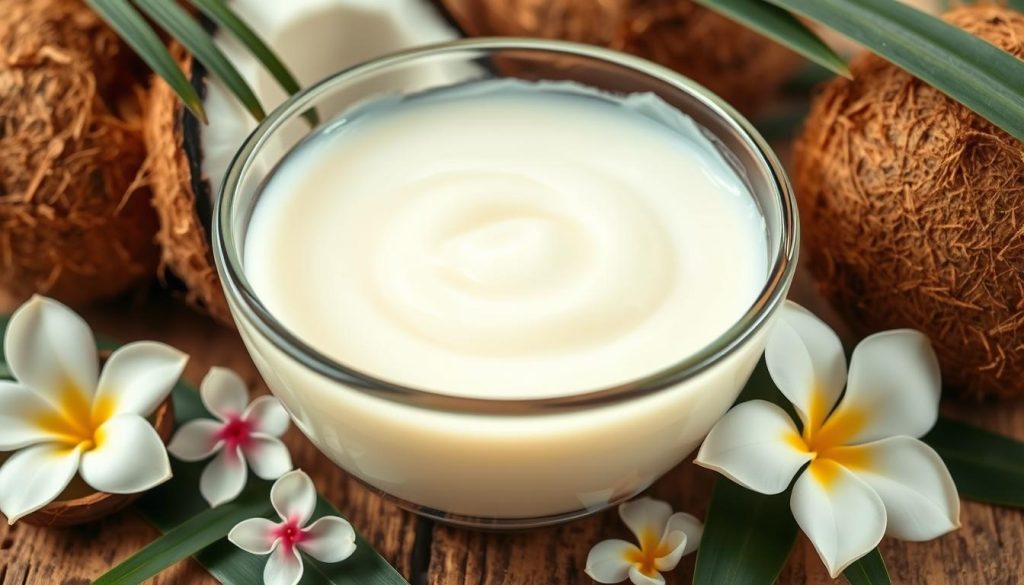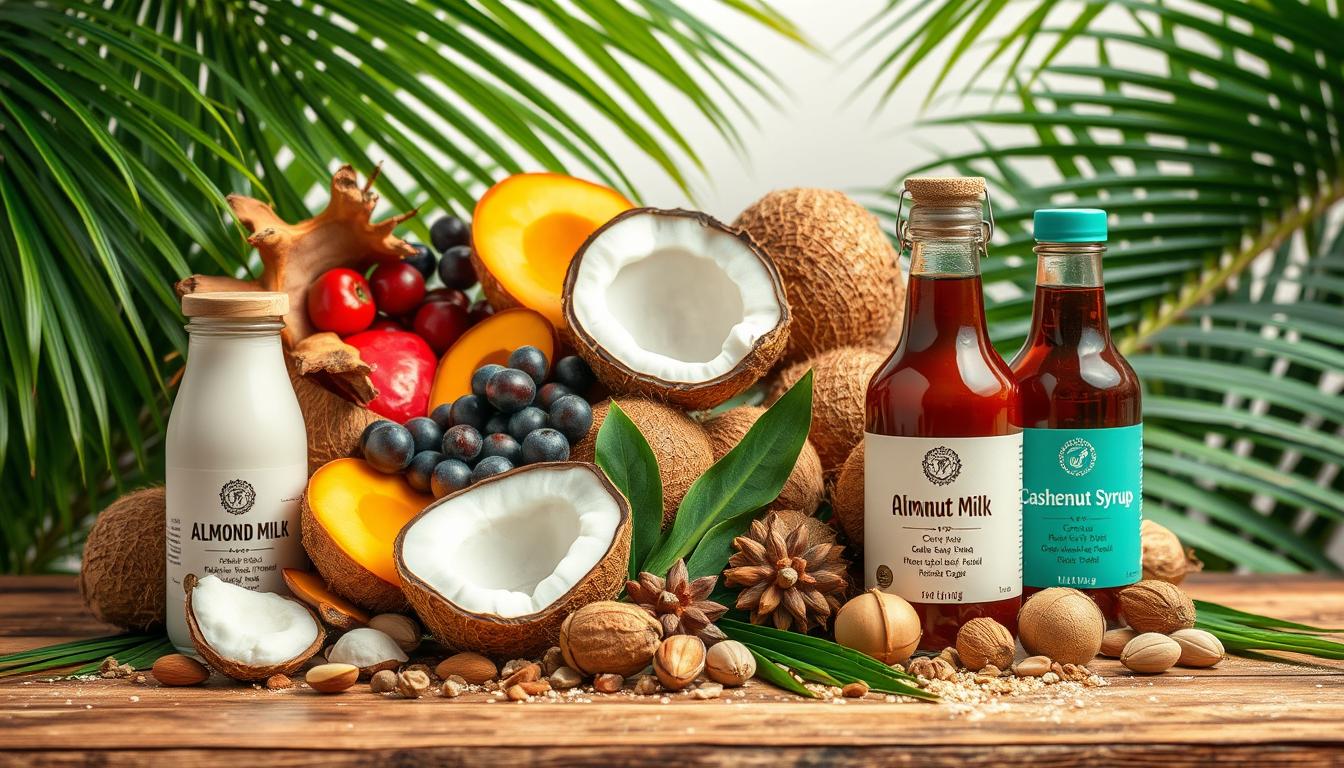Coconut extract is a favorite in many recipes, known for its sweet and nutty taste. Sometimes, you might need alternatives due to availability or dietary needs. This guide offers a detailed look at substitutes for coconut extract that won’t affect your dishes’ taste.
Whether you’re searching for coconut flavor substitutes or practical cooking options, you’re in the right place. Discover the different coconut extract alternatives that keep your dishes tasting great.
Understanding Coconut Extract
Coconut extract is a strong flavor made from coconuts. It’s made by soaking coconut essence in alcohol. This definition of coconut extract shows it’s great for adding flavor to many dishes. Chefs and home bakers love it because it adds a deep coconut taste without changing the dish’s texture.
What is Coconut Extract?
The coconut extract composition includes shredded coconut and alcohol, like rum or vodka. To get the best flavor, mix ¾ – 1 cup of shredded coconut with ¾ cup of alcohol. Alcohol with a high proof helps extract more flavor. Letting the mix sit for 4-6 weeks lets the flavors blend well. Toasting the coconut first can make it even more flavorful.
To toast the coconut, heat it in a 350°F oven for 5-10 minutes. Stir it often until it’s golden brown.
Common Uses of Coconut Extract
The uses of coconut extract are wide-ranging. It’s great in baked goods like cakes and frostings. It also adds flavor to drinks, sauces, and even savory dishes. Its tropical taste makes it essential for both sweet and savory recipes. Making your own coconut extract, especially with fresh toasted coconut, might need more of it to match store-bought flavors.
| Characteristic | Details |
|---|---|
| Flavor Profile | Rich, intense coconut flavor |
| Composition | Shredded coconut and high-proof alcohol |
| Infusion Duration | 4-6 weeks for optimal flavor |
| Toasting Method | Oven at 350°F for 5-10 minutes |
| Calories per Serving | 19 calories |
Reasons to Seek Alternatives
In the kitchen, finding coconut extract can be tough. Many home cooks face shortages, which can mess up meal plans. When coconut extract is hard to find, it’s time to look for substitutes that taste similar.
Availability Issues
Running out of coconut extract starts a search for a good substitute. Availability, seasonal trends, and where you shop affect this search. You might look for alternatives that match coconut extract’s flavor and texture well.
Dietary Restrictions
For some, coconut extract is a no-go due to allergies or dietary needs. Vegans and others with specific diets face challenges. Knowing about coconut extract substitutes helps you make choices that are both tasty and safe for everyone.
Substitutes for Coconut Extract Guide
Finding good substitutes for coconut extract is key. A good substitute should match the flavor and work well in many recipes. It should have the same intensity and be easy to mix with other ingredients. The right coconut flavor substitutes can make your dish taste great and keep the tropical flavor.
What Makes a Good Substitute?
A good coconut extract substitute should taste and feel like the real thing. It should have:
- Flavor Intensity: The same strong flavor as coconut extract.
- Consistency: The same texture as coconut extract, without changing the dish’s feel.
- Integration: It should blend well with other ingredients, keeping the recipe balanced.
Factors to Consider When Substituting
When you’re substituting coconut extract, think about a few key things. These will help you get the best results:
- Flavor Concentration: Know how strong the substitute is to use the right amount.
- Consistency and Sweetness: Watch how the substitute changes the dish’s feel and sweetness.
- Recipe Type: The type of dish you’re making will help you choose the right substitute and how much to use.

| Substitute | Flavor Profile | Usage Guidelines |
|---|---|---|
| Coconut Cream | Rich and Creamy | 1:1 ratio; replaces coconut extract directly |
| Almond Milk | Mild and Nutty | Use at a 1:1 ratio; good for baking |
| Soy Milk | Neutral and Slightly Sweet | Substitute 1:1; adds protein |
| Cashew Milk | Creamy and Nutty | 1:1 ratio; ideal for soups and sauces |
| Silken Tofu | Subtle and Creamy | Blend to a smooth consistency; use 1:1 |
These tips will help you find the right coconut extract substitutes. By thinking about each factor and choosing carefully, you can make dishes that taste great without losing flavor.
Top Coconut Extract Alternatives
Looking for coconut extract substitutes? There are many options that can give you the flavor you want. Here are some top picks:
Coconut Emulsion
Coconut emulsion is a great choice. It’s made by mixing coconut flavor with water, not alcohol. This keeps the flavor strong, just like coconut extract. You can use it the same way in coconut emulsion recipes.
It’s especially good in baked goods. It doesn’t lose flavor when heated, unlike alcohol-based extracts.
Coconut Simple Syrup
Coconut simple syrup is another excellent option. It’s made by mixing sugar water with coconut flavor. This adds flavor and moisture to cakes and cocktails.
When making coconut syrup, you can use it 1:1. Just remember, it adds sugar to your recipe, so you might need to adjust.
Virgin Coconut Oil
Virgin coconut oil comes from fresh coconut meat. It has a rich coconut flavor. You can substitute with coconut oil at a 2:1 ratio.
This adds fat to your recipe but keeps the coconut flavor.
Imitation Coconut Extract
Imitation coconut extract is a budget-friendly option. It tastes like natural coconut extract but is cheaper. It’s good for adding tropical flavor without real coconut.
Use it 1:1 when using imitation extracts.
Coconut Liqueur
Coconut liqueur brings a unique flavor to your dishes. It’s sweet and has a strong coconut taste. It’s great in desserts and cocktails.
Use it 1:1 when using coconut liqueur in recipes. Just be aware of its sweetness and alcohol content.

Coconut Milk Versus Coconut Cream
Coconut milk and coconut cream have their own places in cooking. They bring different tastes and benefits to the table. Knowing the difference helps you pick the right one for your recipes.
Using Coconut Milk as an Alternative
Coconut milk is great for replacing coconut extract in many dishes. It’s good in soups, curries, sauces, and smoothies. You can use it in the same amount as the extract. Just remember to adjust other liquids to keep the right consistency.
Its creamy texture and 13%-17% fat content add richness to both savory and sweet dishes.
Benefits of Coconut Cream for Flavor
Coconut cream is better for a strong coconut taste because of its 19%-22% fat. It’s thicker, making it perfect for desserts, sauces, and toppings. It adds a luxurious feel to your food without watering down the taste.
The unique coconut cream flavor characteristics make it special. It brings out both sweet and savory flavors, making your dishes more enjoyable.
| Aspect | Coconut Milk | Coconut Cream |
|---|---|---|
| Fat Content | 13%-17% | 19%-22% |
| Texture | Light and creamy | Thick and dense |
| Common Uses | Soups, stews, smoothies | Desserts, sauces, whipped toppings |
| Substitution for Extract | Equal amounts | Requires adjustments |
| Storage | Refrigerate after opening | Refrigerate after opening |
Coconut Flakes and Shredded Coconut
Coconut flakes and shredded coconut add more than just looks to your baking. They bring a delightful texture and flavor. This can make your recipes even better.
Incorporating Coconut Flakes in Baking
Coconut flakes can make your baked goods special. You can sprinkle them on top of muffins, cakes, or cookies for a crunchy topping. Or, you can mix them into the batter.
Remember, adding coconut flakes might change how much liquid you need. If you can’t find shredded coconut, try using finely chopped nuts as a substitute.
Texture and Flavor Enhancements
Shredded coconut recipes show how it can boost flavor and add crunch. Toasting coconut flakes before using them can make their flavor even better. This adds a richer taste to desserts like coconut cream cake and coconut bliss balls.
Coconut is great for mixing with other flavors. It pairs well with chocolate, fruit, or nuts. This makes it a versatile ingredient in the kitchen.
Conclusion
Exploring coconut extract alternatives can greatly enhance your cooking. This guide helps you find substitutes that keep your dishes flavorful. You don’t have to give up on taste, even with ingredient restrictions or when things are hard to find.
Coconut emulsion, coconut milk, and even silken tofu or cashew cream can replace coconut extract. Each option brings its own special qualities to your recipes. This way, you can keep that coconut flavor in your dishes, even with different ingredients.
Knowing your options and how to use them makes cooking easier. You can adjust your recipes to fit your dietary needs or preferences. With the right substitutions, every dish can feel like a trip to a tropical paradise.
Source Links
- https://thecoconutmama.com/best-coconut-extract-substitutes/
- https://cookscrafter.com/coconut-extract-substitutes/
- https://gustomeadow.com/coconut-extract-substitutes/
- https://flippindelicious.com/homemade-coconut-extract-recipe/
- https://myindianstove.com/coconut-facts/
- https://www.quickeasycook.com/coconut-extract-substitute/
- https://www.allrecipes.com/coconut-milk-substitutes-7548935
- https://www.healthline.com/nutrition/coconut-milk-substitute
- https://godairyfree.org/news/substitute-for-coconut-milk-and-oil
- https://www.livveganstrong.com/coconut-substitutes/
- https://thecoconutmama.com/what-is-coconut-extract/
- https://hot-thai-kitchen.com/coconut-milk-101/
- https://www.webstaurantstore.com/blog/3962/coconut-milk-vs-coconut-cream.html?srsltid=AfmBOorlA1C-MpGVJQ_39ri7O8YnHrHtYE9Yv0YWH5iZCE4wy4Sljdj4
- https://www.alphafoodie.com/how-to-make-shredded-coconut-desiccated-coconut/
- https://www.slurrp.com/article/exploring-the-5-amazing-shredded-coconut-substitutes-1696941081267
- https://www.cleaneatingkitchen.com/best-substitutes-for-coconut-aminos/
- https://saltedplains.com/coconut-cream-substitutes/
- https://www.globalresourcesdirect.com/blog/desiccated-coconut-substitute/
